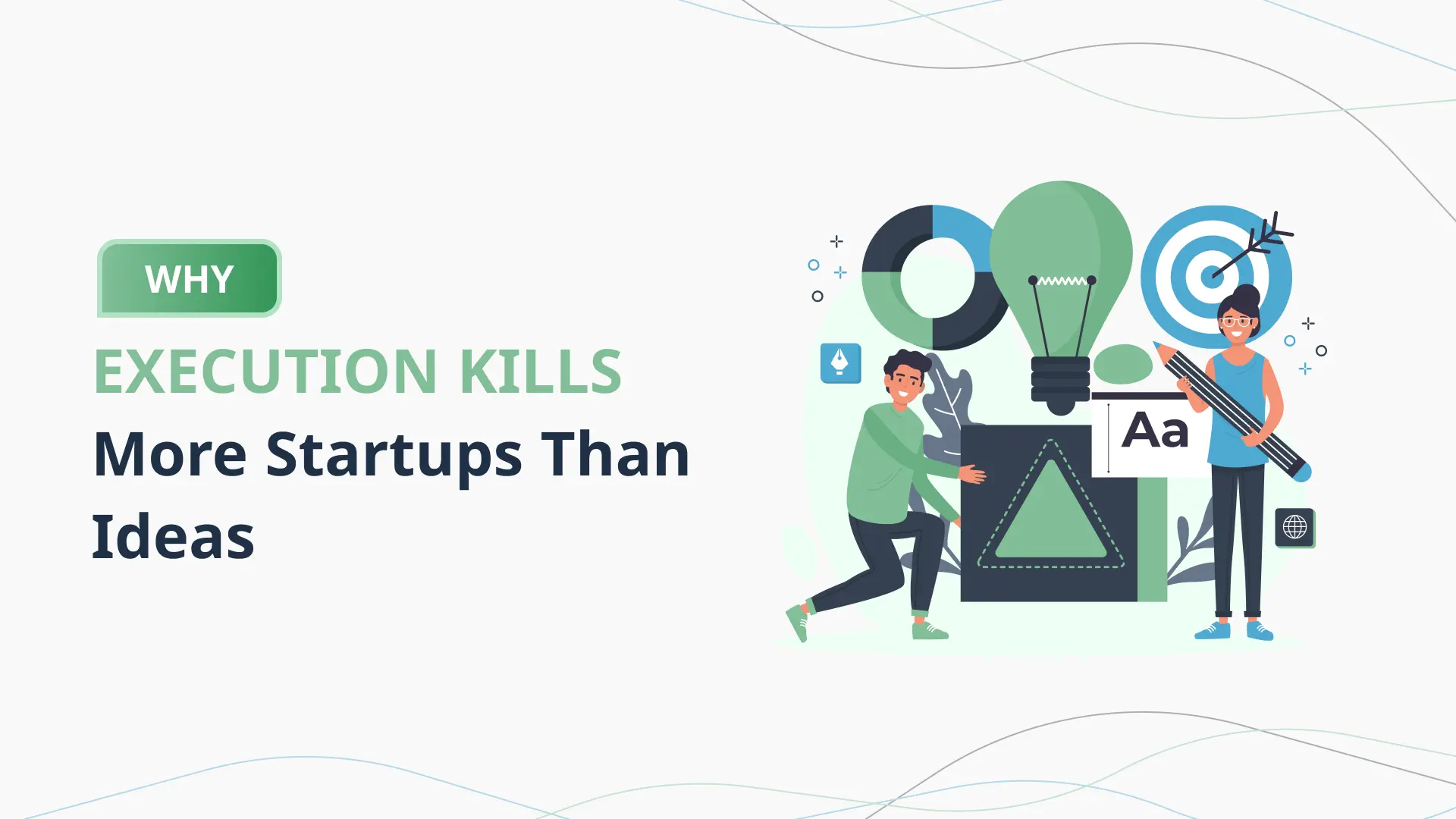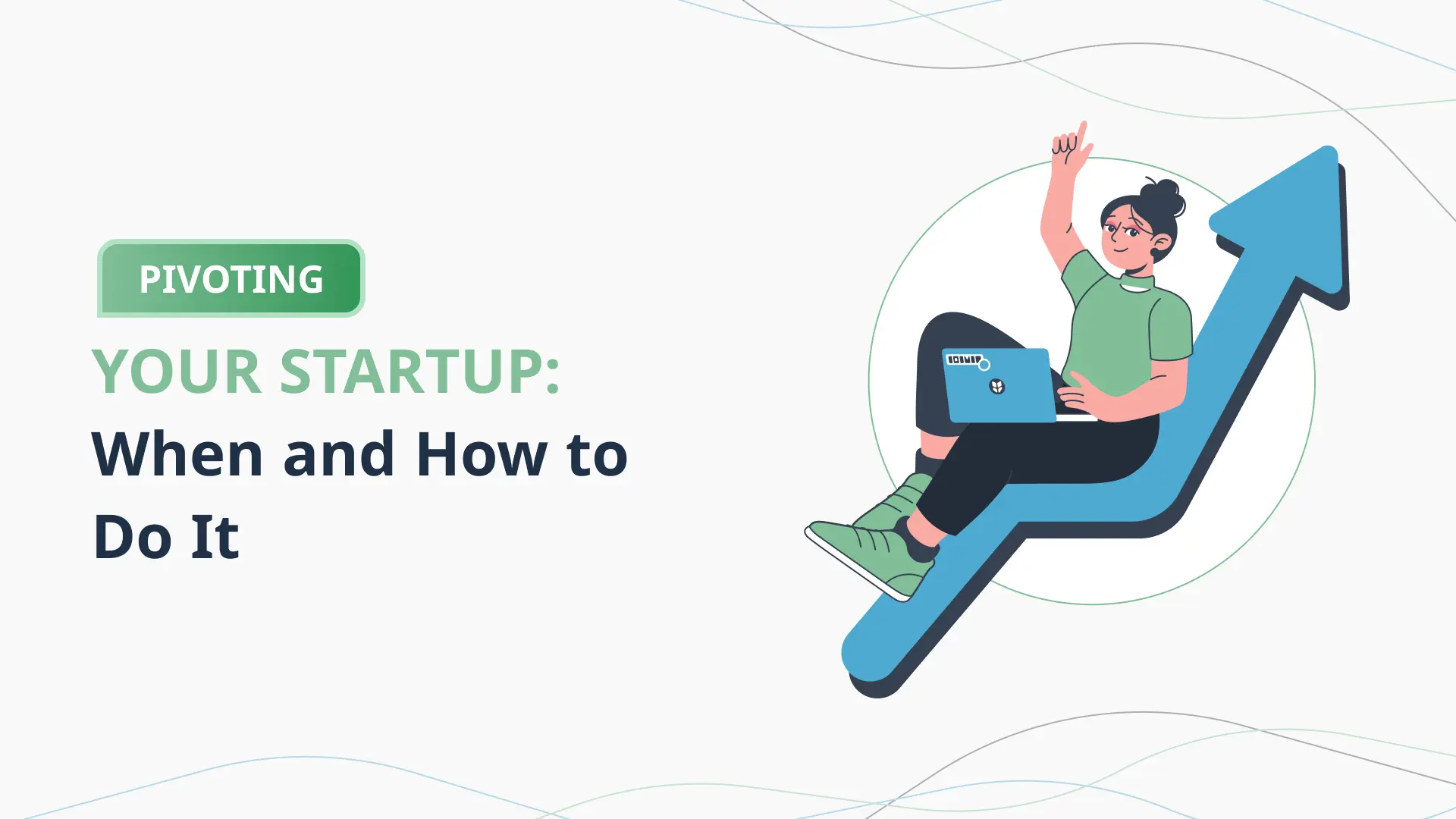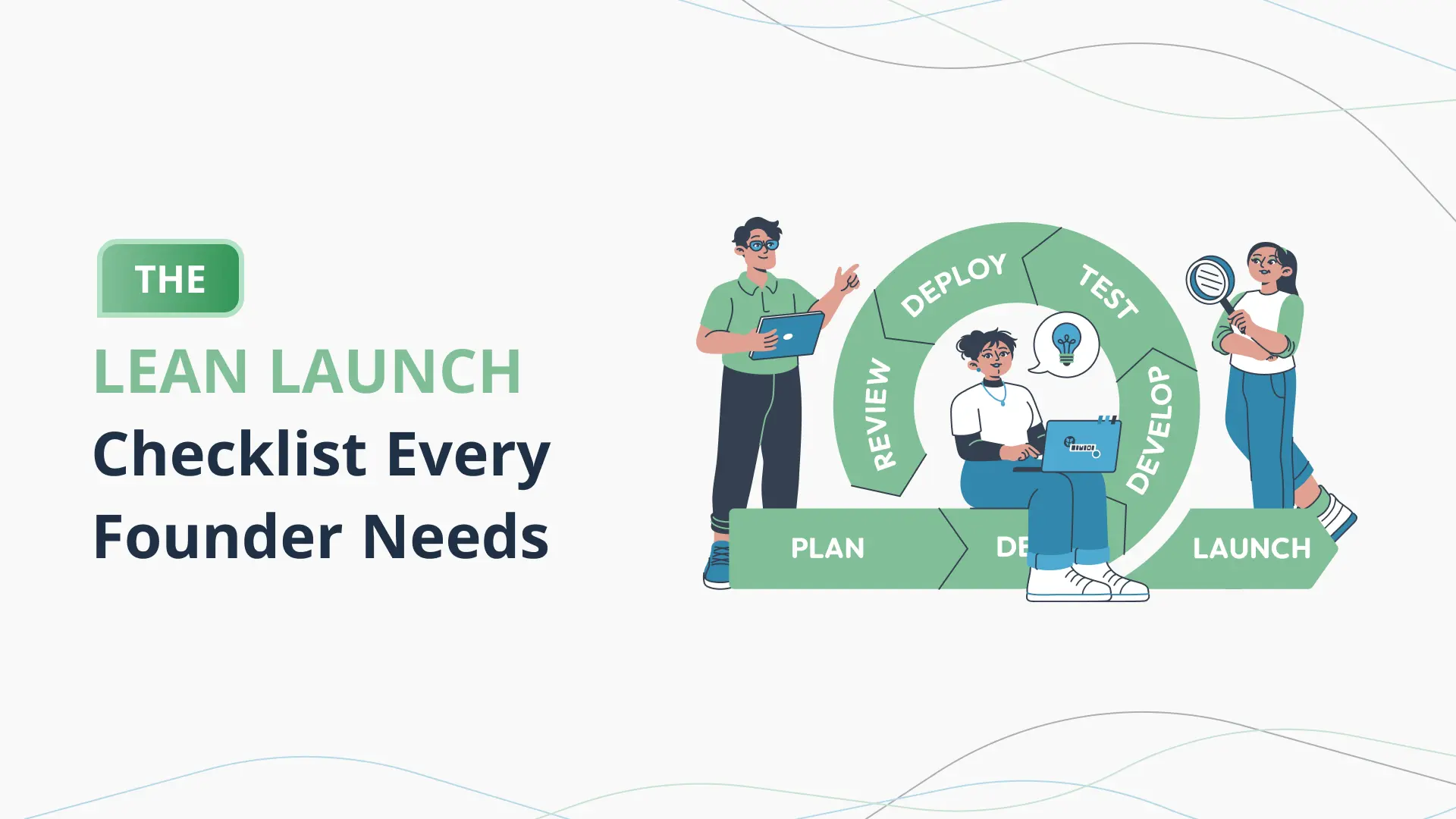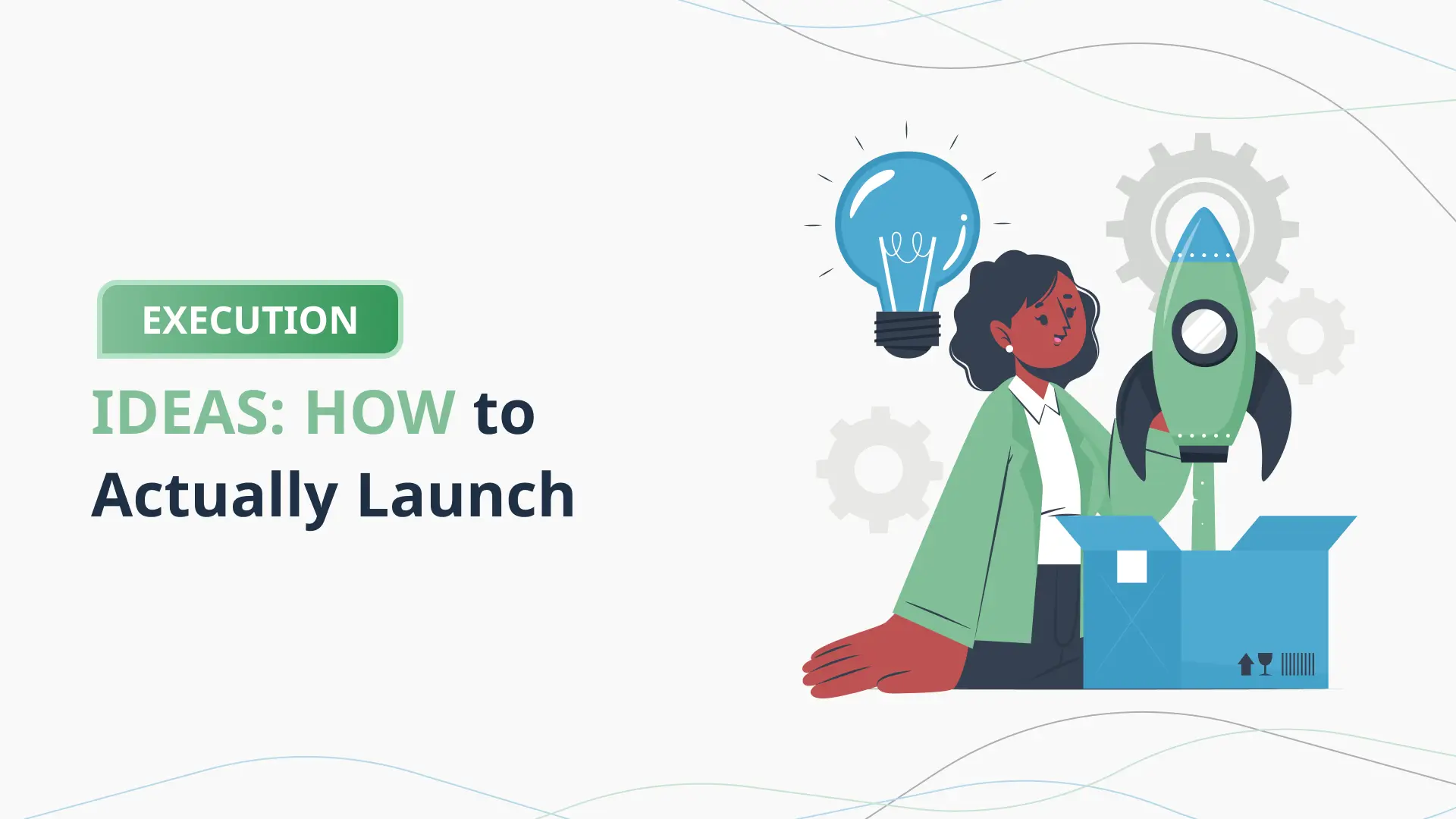Why Execution Kills More Startups Than Ideas

Introduction: Why Execution Kills More Startups Than Ideas
The Myth of the "Perfect Idea"
In the startup world, there’s a seductive myth that floats around co-working spaces and pitch decks — the myth of the “perfect idea.” It’s the notion that all you need is one brilliant concept to unlock fame, fortune, and fast-track success. This belief is not only misguided; it’s dangerous. It causes entrepreneurs to fixate on ideation while neglecting the messy, difficult, and essential work of execution.
Let’s get one thing straight: ideas are important. But they are not rare. Ideas are everywhere — floating in conversations, scrawled on napkins, locked away in “someday” journals. Chances are, someone, somewhere in the world, has had the same idea as you. The difference? Only a few will take that idea beyond the drawing board. Fewer still will execute it well.
History backs this up. Take Facebook, for example. It wasn’t the first social network — Friendster and MySpace got there first. What separated Facebook was its execution: a clear value proposition, a clean user interface, aggressive growth strategies, and a founder obsessed with improvement. The same could be said of Google. They weren’t the first search engine, but they became the best through relentless focus on speed, relevance, and innovation.
On the flip side, we’ve seen countless “perfect” ideas flop. Juicero, a high-tech juicer that raised over $120 million, failed because its execution lacked logic and practical value. Its juice packets could be squeezed by hand, rendering the $400 machine unnecessary. The idea was glossy and headline-worthy, but the execution? Deeply flawed.
The danger of the “perfect idea” mindset is that it creates inertia. Founders spend months or years in stealth mode, obsessing over details, fearing theft, or waiting for ideal conditions. They delay launching until everything is “just right.” Meanwhile, successful startups are already in the market, learning, iterating, and evolving through customer feedback.
Even investors have shifted their focus. They don’t invest in ideas; they invest in teams that can execute. A seasoned founder with a decent idea is often more attractive than a first-timer with a “brilliant” one. Why? Because execution is what turns potential into profit. It’s what scales teams, attracts customers, and fends off competition.
Execution is also the best validator of an idea. The market, not the mirror, determines whether an idea is good. Only by building something real and putting it in front of real users can you test its worth. The feedback you gather, the iterations you make — that’s where value is created. A pivot, not a pitch, often saves a startup.
The startup world doesn’t reward daydreams. It rewards doers. That’s why tools like PlanVista are invaluable. With features designed to move founders from ideation to action — from business plan generation to market strategy development — PlanVista encourages execution. It helps you put structure around your idea, analyze its potential, and start building with confidence.
Because in the real world, it’s not the idea that matters most — it’s what you do with it.
Execution as the Differentiator
In a crowded marketplace where many startups are built on similar ideas, execution is what sets the winners apart. Execution is where strategy meets action — it’s how a business plan becomes a product, how a marketing strategy becomes customer acquisition, and how a team’s potential becomes real traction. Without strong execution, even a brilliant idea is just another “what could have been.”
Let’s take a simple truth: many startups have similar ideas. Ride-sharing wasn’t invented by Uber. Airbnb didn’t pioneer the idea of short-term rentals. Canva didn’t invent graphic design. What they did was execute — consistently, strategically, and often better than anyone else in their space. That’s why they won.
Execution is a combination of clarity, consistency, adaptability, and accountability. It begins with a clear understanding of the problem being solved and the value being delivered. But that’s just the start. Startups must consistently deliver on their promises, iterate quickly based on user feedback, and stay aligned with their mission even as they adapt to new challenges.
Startups often fail not because they didn’t have the right idea, but because they couldn’t get their product to market fast enough, failed to scale operations, or couldn’t attract and retain customers. These are all execution issues. Even a solid business model can falter if the team can’t navigate real-world obstacles like supply chain hiccups, cash flow gaps, or shifting market dynamics.
Effective execution also means making tough decisions quickly. When something isn’t working — a feature, a sales strategy, a pricing model — startup teams must be willing to pivot. Being stubborn about an original idea is a common trap. Great execution involves knowing when to let go, when to double down, and when to completely reimagine the roadmap.
Culture plays a huge role here. Execution thrives in teams that are accountable, collaborative, and resilient. It’s about hiring the right people, communicating goals clearly, and creating systems that support productivity and innovation. A startup with a high-functioning team and a mediocre idea will almost always outperform a dysfunctional team sitting on a goldmine.
Another hallmark of strong execution is data-driven decision-making. Startups that monitor key metrics — like user engagement, conversion rates, and churn — are better positioned to adapt and improve. Data tells the real story, not assumptions. And when startups respond to data instead of ego, they sharpen their execution and align closer with what the market wants.
This is where tools like PlanVista shine. As a startup planning tool, PlanVista helps founders not only create their business plans but also track execution against key performance indicators. From setting financial targets to mapping customer journeys, PlanVista makes the process visible and measurable — turning strategy into actionable insights.
So while many founders chase the next big idea, the real secret lies in doing what others won’t: executing better, faster, and smarter. Because in the end, it’s not just about who had the idea first — it’s about who did it best.
Common Execution Pitfalls
Startups live and die by their ability to execute. Yet, even the most passionate, resourceful founders often stumble over avoidable execution pitfalls. These aren’t exotic failures — they’re common, recurring patterns that have taken down hundreds of promising ventures. Understanding and proactively guarding against these traps can make the difference between scaling and stalling.
1. Lack of a Clear Strategy
A frequent mistake is diving into execution without a well-defined strategy. When founders skip over planning in their eagerness to build, the result is often unfocused action. Resources are spread too thin, goals are misaligned, and progress becomes difficult to measure. Execution without strategy is like sailing without a compass — you may be moving fast, but you have no idea where you’re going.
Startups need a roadmap, and not just any roadmap — one that’s grounded in research, realistic goals, and a clear understanding of the market. That’s why platforms like the PlanVista app are critical. By helping startups generate data-driven business plans, PlanVista ensures founders execute with precision and clarity.
2. Poor Team Dynamics
Even with a great plan, execution will falter if the team isn’t aligned. Poor communication, unclear roles, and mismatched expectations can create friction and bottlenecks. Startups move fast, and every team member needs to operate at a high level of trust and transparency. One weak link — a disengaged co-founder, an underperforming developer — can drag down the entire effort.
Great execution thrives in healthy team cultures. That means defining roles early, setting clear expectations, and fostering a culture of accountability. When everyone knows what success looks like and how they contribute to it, execution becomes streamlined and effective.
3. Inadequate Market Understanding
Many startups build first and ask questions later — a costly mistake. Failing to deeply understand customer needs, pain points, and behavior leads to poor product-market fit. The result? A product no one wants to buy, no matter how well it’s built.
Effective execution requires constant engagement with users. This means talking to customers, analyzing behavior, and being willing to pivot when assumptions prove wrong. A planning tool like PlanVista can help by incorporating market analysis and customer profiling into the startup’s strategy from day one.
4. Operational Inefficiencies
Startups often overlook operations in their pursuit of growth. But execution bottlenecks — slow development cycles, inventory mismanagement, or delayed onboarding — can derail momentum. Startups need streamlined processes that scale, not just flashy front-end ideas.
Standard operating procedures, clear workflows, and regular retrospectives help refine operations. Early-stage startups should also prioritize tools and platforms that automate repetitive tasks and reduce friction, keeping the team focused on what truly drives growth.
5. Resistance to Feedback
Perhaps the most lethal execution flaw is ignoring feedback. Founders can become emotionally attached to their original vision and dismiss criticism or market signals. This rigidity prevents iteration, which is vital for refining the product and business model.
The most successful startups treat feedback as a gift, not a threat. They run lean experiments, listen actively, and adjust quickly. Execution isn’t about proving you were right from the start — it’s about adapting fast enough to stay in the game.
Avoiding these execution pitfalls doesn’t guarantee success, but it significantly increases your odds. And with AI-powered tools like PlanVista helping streamline strategy, planning, and iteration, startups have more support than ever to stay on track.
The Role of AI in Enhancing Execution
In today’s fast-paced startup ecosystem, agility, precision, and data-driven decision-making are not just nice to have—they’re essential. This is where artificial intelligence (AI) becomes a game-changer. AI is no longer confined to the realm of tech giants; it’s now accessible and transformative for startups at every stage. When applied correctly, AI enhances execution by automating routine tasks, extracting actionable insights from complex data, and enabling more informed strategic decisions.
Let’s start with one of the most critical aspects of execution: understanding your market. Traditionally, this involves hours of manual research, compiling spreadsheets, and drawing inferences from limited datasets. AI eliminates that bottleneck. AI-powered analytics can scan large volumes of data—from competitor trends to customer reviews—to uncover patterns and opportunities in real-time. This empowers startups to pivot faster, launch smarter, and execute with greater confidence.
Another major benefit of AI in execution is automation. Startups typically operate with lean teams, making efficiency a top priority. AI tools can automate repetitive, time-consuming tasks like scheduling, customer support, lead generation, and even parts of marketing campaigns. Chatbots, for example, can handle customer inquiries 24/7, improving responsiveness without adding headcount. This frees up human talent to focus on strategic, high-impact work.
AI also enhances financial management—an area where many startups stumble. Cash flow issues are a leading cause of startup failure. AI tools can monitor spending, forecast financial scenarios, and alert founders to potential red flags. These predictive insights enable better decision-making and help avoid costly missteps. When you know where the numbers are trending, you can course-correct before it’s too late.
Personalization is another execution lever powered by AI. From marketing messages to product recommendations, AI allows startups to tailor experiences to individual users at scale. This not only improves customer engagement but also boosts retention and conversion rates—key execution metrics for any startup. Personalized onboarding, emails, and support all enhance the user journey, creating more value from each interaction.
Moreover, AI facilitates better team and project management. AI-enabled platforms can prioritize tasks, track team performance, and even suggest workflow optimizations. By identifying bottlenecks or inefficiencies, these tools support smoother execution across departments.
This is precisely the vision behind the PlanVista app—an AI business plan tool built for founders who understand that ideas alone aren’t enough. PlanVista doesn’t just generate business plans; it continuously enhances execution. With features like smart financial modeling, automated market analysis, and KPI tracking, PlanVista empowers startups to align daily execution with long-term strategy.
By integrating AI at every step, PlanVista transforms planning from a one-time event into a living, evolving process. It ensures startups aren’t just reacting but are proactively shaping their path with data-backed decisions and real-time insights. In a world where execution defines success, leveraging AI isn’t just an advantage—it’s a necessity.
As we enter an era where data moves faster than instinct, the startups that embrace AI will out-execute, out-learn, and outlast their competition.
Leveraging PlanVista for Effective Execution
At the heart of every successful startup is a clear, actionable, and adaptable plan. But turning that plan into consistent, effective execution is where many ventures struggle. That’s why tools like PlanVista exist — to bridge the gap between vision and reality. As an AI-powered business plan generator and startup planning tool, PlanVista equips entrepreneurs with the framework and insights they need to execute their ideas with precision and confidence.
Transforming Ideas into Actionable Plans
The first step to execution is planning — but not just any plan. Founders need a living document that evolves with their startup. PlanVista helps entrepreneurs craft detailed, investor-ready business plans that don’t just sit on a shelf. These plans include market analysis, competitive positioning, revenue models, and milestone tracking — all generated or guided by AI to ensure relevance and accuracy. It’s a huge leap from guessing to informed action.
Real-Time Market Analysis and Validation
One of the most powerful features of PlanVista is its real-time market analysis capabilities. Founders often execute in a vacuum, relying on outdated research or assumptions. PlanVista pulls in current market data, customer trends, and competitor insights, helping startups validate their strategy before they burn capital. This ensures that every move — from product development to go-to-market strategy — is backed by real intelligence.
AI-Driven Financial Modeling
Cash flow, burn rate, runway — these aren’t just buzzwords; they’re survival metrics. PlanVista’s financial modeling tools allow startups to build dynamic forecasts based on real data. Founders can test different revenue scenarios, plan fundraising timelines, and identify financial red flags early. With AI interpreting trends and suggesting adjustments, it’s like having a virtual CFO on your team, without the overhead.
Execution Dashboards and KPI Tracking
Execution isn’t just about launching — it’s about learning and improving. PlanVista’s dashboards make it easy to track key performance indicators (KPIs) in real time. Whether it’s user acquisition, churn, monthly recurring revenue, or customer lifetime value, PlanVista keeps these metrics visible and actionable. Founders can quickly identify what’s working and what’s not, enabling rapid iteration.
Collaborative Planning and Team Alignment
Startups don’t execute alone. PlanVista is designed for collaboration, allowing team members, advisors, and investors to stay aligned and engaged. Founders can assign tasks, update progress, and receive feedback within the platform, creating a centralized hub for all strategic execution. This eliminates the disconnect between strategy meetings and daily operations, keeping everyone focused on shared goals.
Conclusion: From Ideas to Impact — Make Execution Your Edge
Ideas spark excitement, ignite passion, and inspire bold ambitions. But in the world of startups, ideas alone are not enough. What separates fleeting dreams from lasting ventures is execution — the relentless, disciplined, and often unglamorous work of turning a vision into a thriving, sustainable business.
Throughout this blog, we’ve explored why execution kills more startups than ideas ever will. We’ve examined the myths that glamorize the “perfect idea” while undervaluing the grind of implementation. We’ve seen how execution, not originality, drives companies like Facebook, Airbnb, and Canva to the top of their industries. We’ve identified common pitfalls — from poor team dynamics to lack of market insight — that derail even well-funded ventures. And we’ve uncovered how artificial intelligence is revolutionizing execution, making it faster, smarter, and more responsive than ever before.
But perhaps the most important takeaway is this: execution is a skill you can build, a process you can improve, and a discipline you can master. With the right tools, mindset, and support, any founder can dramatically increase their odds of success.
That’s exactly where the PlanVista app comes in.
PlanVista isn’t just another business tool; it’s your co-pilot in execution. It’s an AI business plan generator, a startup planning tool, and a strategic command center all rolled into one. Whether you’re validating your idea, modeling your finances, understanding your market, or tracking your KPIs, PlanVista helps you do it faster, better, and more confidently.
Instead of staring at a blank document wondering where to start, you can generate a full business plan in minutes. Instead of spending weeks on spreadsheets and scattered research, you get instant, data-driven insights tailored to your industry. Instead of making reactive decisions, you execute proactively — with clarity and foresight.
So, if you’re an aspiring founder, a growing startup, or even a serial entrepreneur who knows that execution is everything, don’t go it alone. Equip yourself with the tools that can make execution your competitive advantage.
Because while the world rewards great ideas, it champions those who bring them to life. Don’t let your vision become another statistic. Start strong, stay focused, and execute with precision.
FAQs
Because execution — not ideation — determines whether a startup can build, adapt, and scale sustainably.
Clear strategy, team alignment, market understanding, operational efficiency, and responsiveness to feedback.
AI enhances planning, automates tasks, personalizes customer experiences, and provides data-driven insights.
PlanVista is an AI-powered startup planning tool that helps entrepreneurs build business plans, model finances, and execute strategies effectively.
Absolutely. It’s designed to help startups at any stage move from concept to execution with clarity and confidence.










